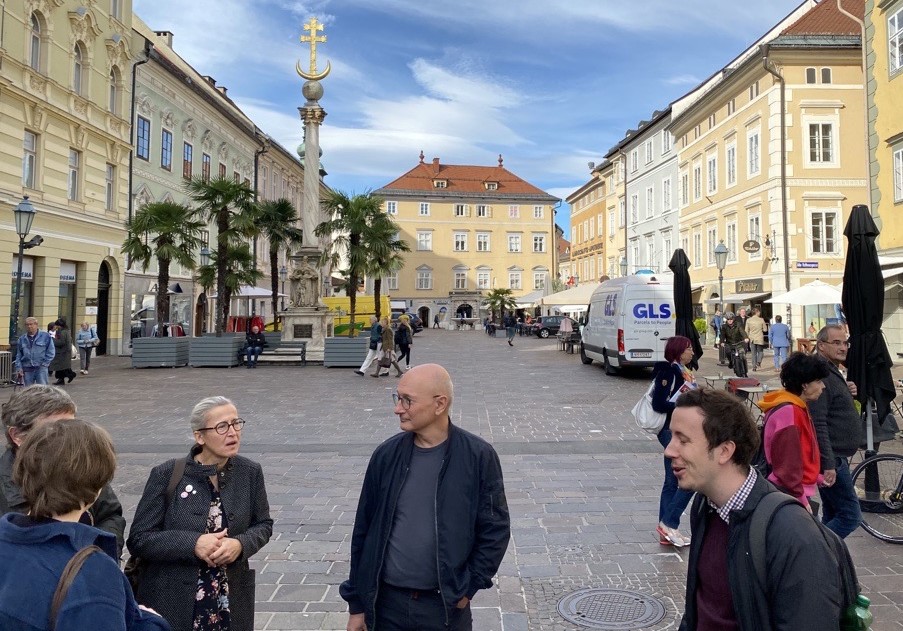The final TANGO-W project face-to-face meeting in Klagenfurt
Klagenfurt, October 2024
The final face-to-face TANGO-W Community of Practice (CoP) meeting, held from October 8th to 9th, 2024, in Klagenfurt (Austria), marked the concluding gathering for the project. It focused on reflection and the exchange of progress across all Urban Living Labs (ULLs). Held over two days, the CoP provided a platform for our project members to evaluate and share their achievements, challenges, and learnings, drawing on each city’s unique contributions to urban transformative capacity (UTC).
A day of interactive stations
Day 1 was organized into a series of interactive stations. Each station focused on different aspects of the ULL), allowing participants to dive into specific topics, share insights, and discuss the unique challenges of their respective ULL project.
The day began with a session focused on the reflection of the vision statement defined by the TANGO-W partners in the beginning of the project. Here, participants reflected on the importance of setting a shared vision that aligns with each ULL’s specific urban goals.
Station 2 delved into each ULL’s initial situation and strategic framework, with participants from Stockholm, Norrtälje, Halden, Marker, Alytus, and Weiz presenting their unique goals, stakeholder networks, and strengths and weaknesses. Each city outlined its approach to addressing local needs. At
In station 3, the focus shifted to collaborative architecture, where each ULL analyzed the strengths and potential risks of their initial designs. Project members discussed the complexity of creating architectures that accommodate diverse perspectives and enable flexibility.
Station 4 was about the researcher-city collaboration. Participants reflected on the essential collaboration between researchers and city partners, discussing best practices.
In Station 5, participants reviewed lessons learned, particularly emphasizing the different roles that various stakeholders play in the ULLs. Key insights highlighted the importance of engaging the right people for each role, recognizing that ULLs often require individuals and organizations with specialized skills in areas like urban agriculture, architecture, and community engagement. Additionally, new roles often emerge in the ULL context, demanding skills like adaptability, networking, and the ability to persistently advocate for transformative ideas even when faced with resistance.
Station 6 was about the specific learnings of ULL Weiz and Norrtälje.
Station 7 examined how new interventions often necessitate the abandonment of habitual practices. The session encouraged participants to challenge established routines and adopt new approaches, particularly in response to rapidly changing urban challenges.
This led to Station 8, a reflective summary where participants considered what they would carry forward into future projects. Key takeaways included the need to develop more effective methods for scaling local insights to other cities and creating flexible frameworks that can adapt to diverse urban contexts.
The progress and insights from ULL’s
Day 2 provided space to delve into the progress and insights from each ULL’s work, focusing on the impact of these projects on their respective communities. Presentations from the seven ULLs showcased their varied achievements and challenges. The following monitoring session emphasized the complexities involved in tracking success within ULLs. Participants discussed critical success factors, such as the need to capture success stories to illustrate UTC achievements better. There was a recognized challenge in reconciling the various perspectives and priorities of stakeholders across different cities, as each ULL operates within its unique urban ecosystem.
Finally, a discussion on social architecture underscored that traditional metrics often fail to capture the social dynamics integral to ULL success. Although difficult to measure, describing and reflecting on social architecture was seen as critical to understanding and sustaining effective collaborative frameworks.
Sincere gratitude to all partners, stakeholders, and teams who contributed to this journey—each insight and achievement paves the way for future urban transformations.



Photos: Nordregio